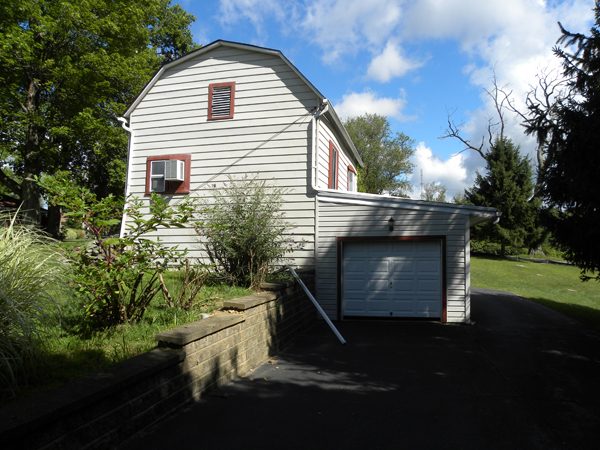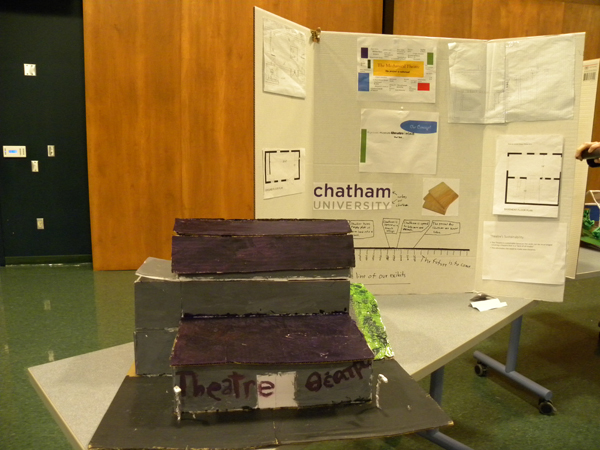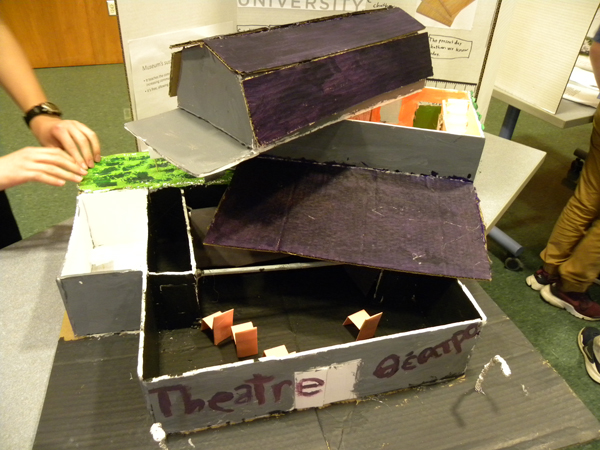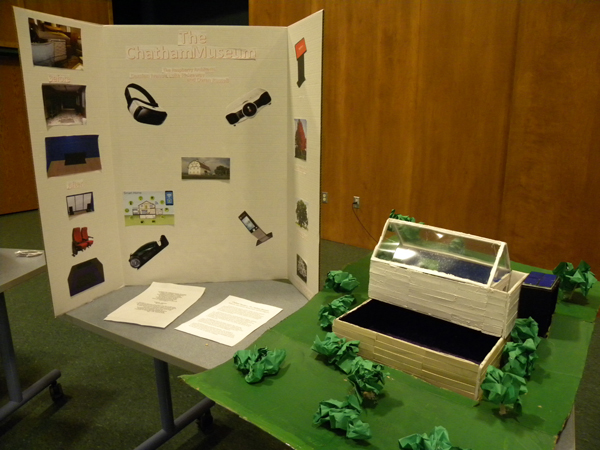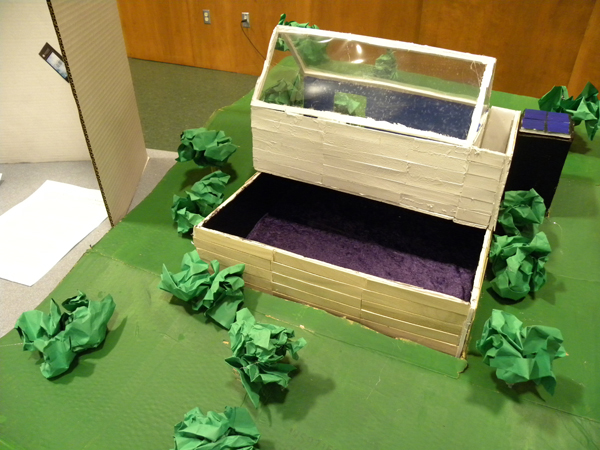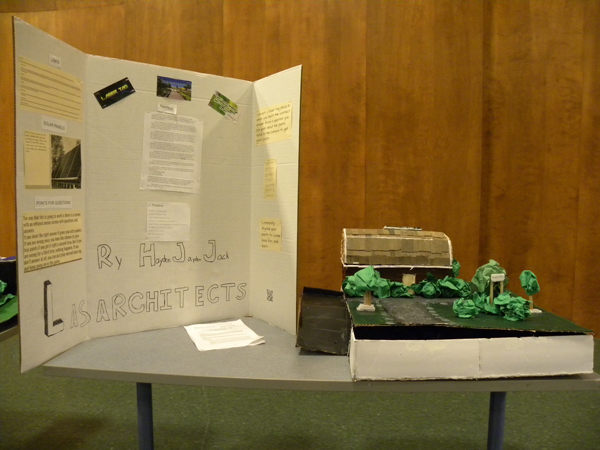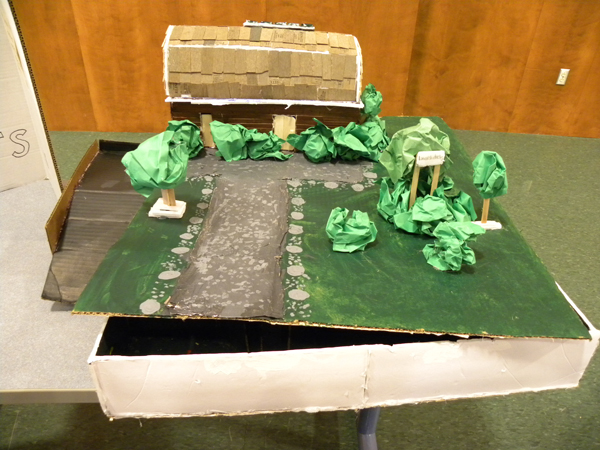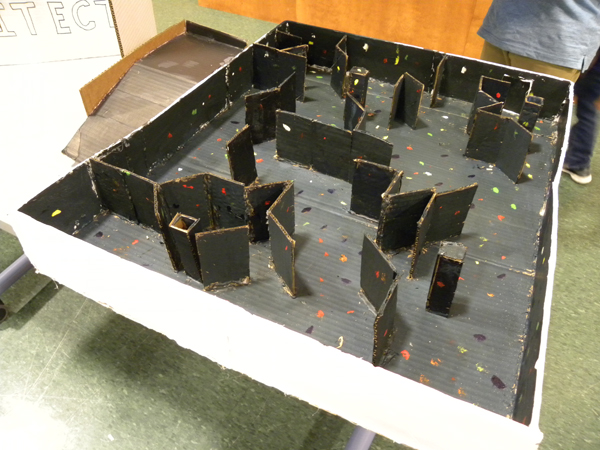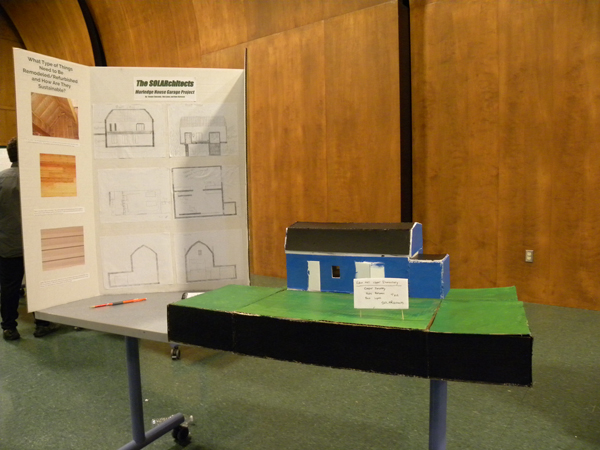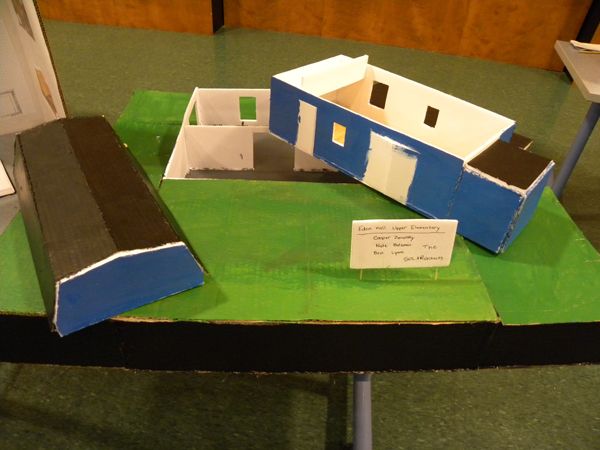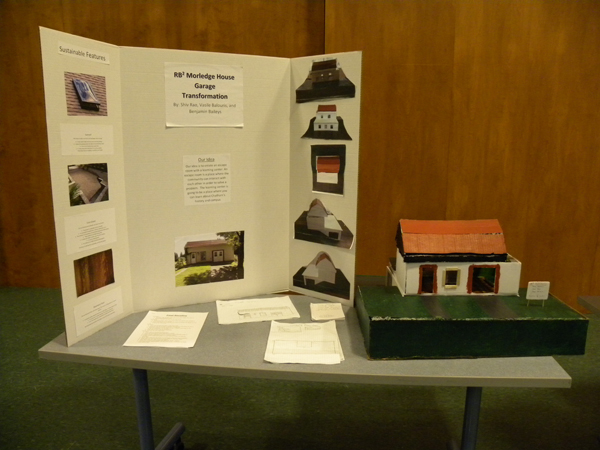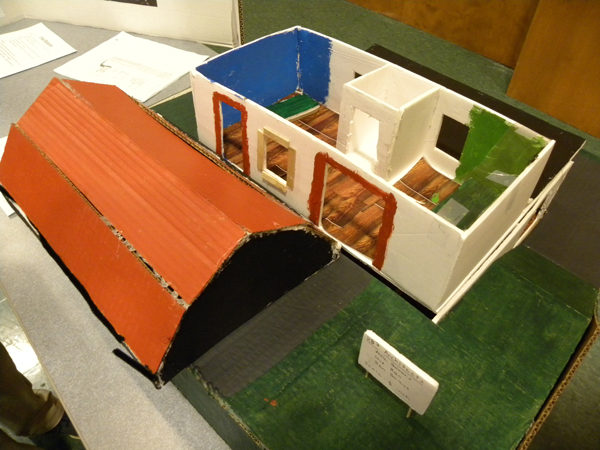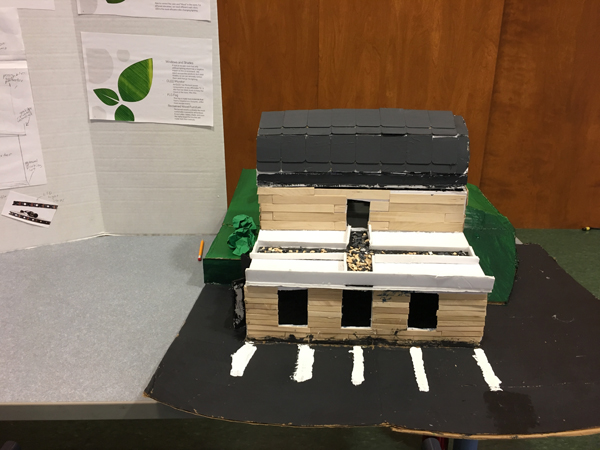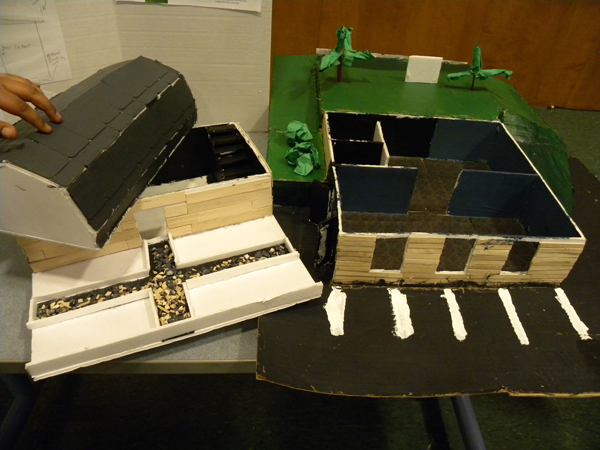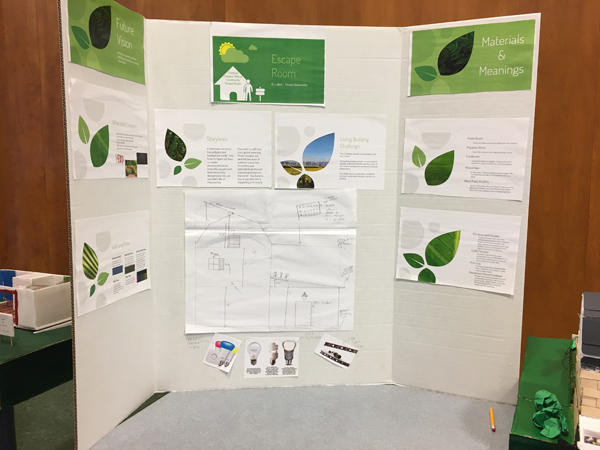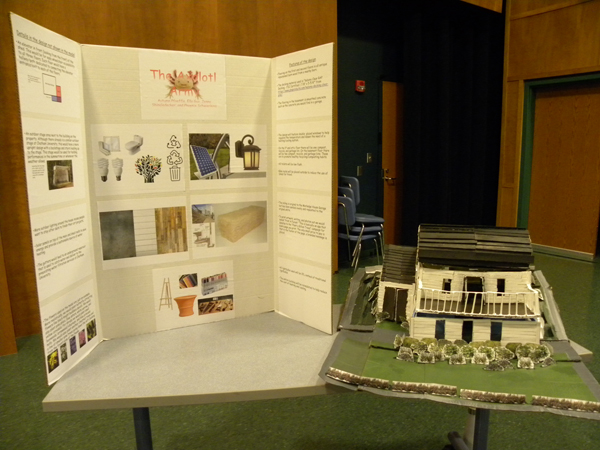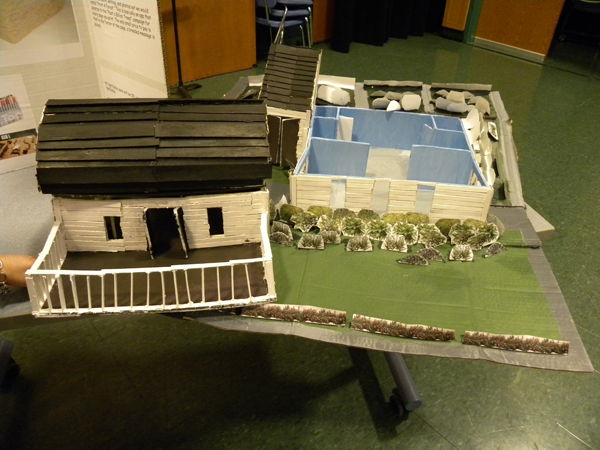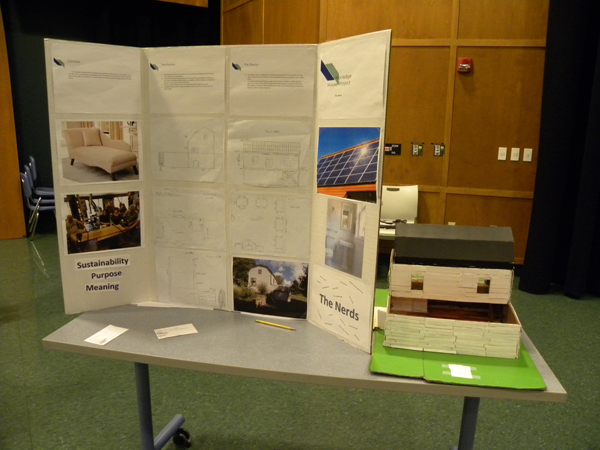
Latest News
-
Thank You, Summer Interns
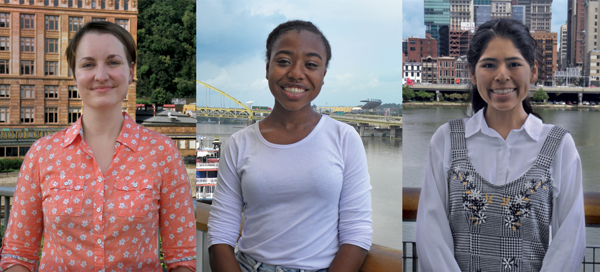
Amanda Seim, Lauren Jasper, and Maria Brown volunteered with PHLF’s education department this summer.
Three talented young people––Maria Brown, Lauren Jasper, and Amanda Seim––volunteered with PHLF’s education department this summer, assisting especially with tours, presentations, and publications.
“Maria, Lauren, and Amanda offered important edits to our new guidebook, Exploring Pittsburgh: A Downtown Walking Tour, and constructive feedback on our Free Friday Walking Tours. In addition, Amanda created and led a neighborhood walking tour of East Liberty and Lauren and Maria planned and developed materials for a new school tour featuring a group of Pittsburgh places named for famous people,” said Executive Director Louise Sturgess. “We were able to accomplish so much more with their help, and we thank each of them for spending time with us.”
Maria, Lauren, and Amanda added these comments about their experience with PHLF during the summer of 2018:
Through my time going on tours, assisting in the development of a new tour, and producing and editing written works, I acquired skills useful for my career path and knowledge about Pittsburgh’s history and architecture. I also gained an understanding of what kind of place Pittsburgh is for its people and how those people will create and protect their city, my new home. Thank you PHLF for the privilege and experience of being a summer intern! ––Maria Brown (Davidson College, English)
This summer, I gained a new level of understanding about the city that I love. As an aspiring architect, it was great for me to learn about the characteristics that make Pittsburgh buildings unique and beautiful. –– Lauren Jasper (The Ellis School)
My experience at PHLF has really impressed me with how important educational programming is in bringing local history to life and instilling community pride. I’ve been able to see firsthand that once people know more about the history in their surrounding environment, they care more about it. ––Amanda Seim (Duquesne University, Public History)
-
Good Luck and the Ability to Take Risks: A Story of Preservation
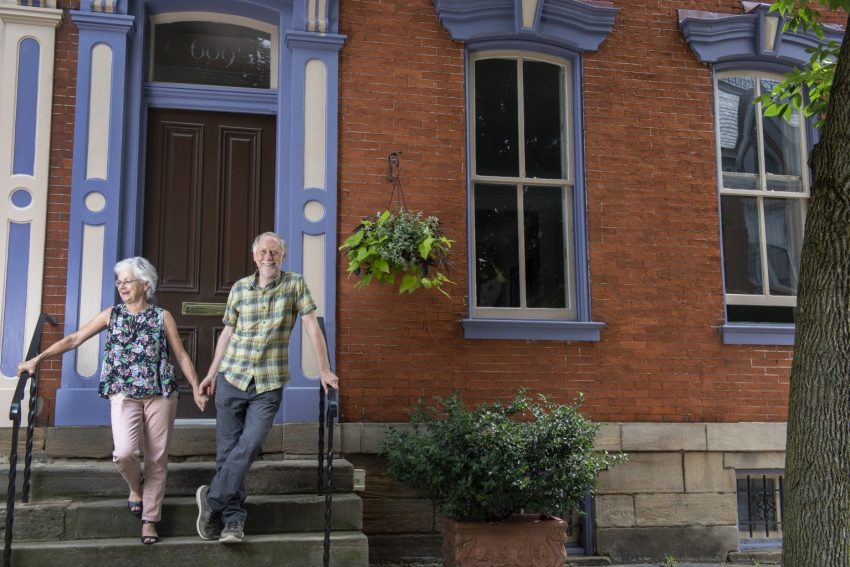
Clare and Duncan Horner, standing outside their house at 609 Taylor Avenue, in the Mexican War Streets on the North Side of Pittsburgh.
By Christine McClure, PHLF member and volunteer writer
When Clare and Duncan Horner met in England in the early 1970s, Clare was part of an exchange program in social history at Warwick University through the University of Pittsburgh. Duncan was also a Warwick University student and former apprentice compositor who had attended Ruskin College in Oxford.
They both discovered that they had an interest in old buildings and architecture. “The old appealed to me,” said Clare. Duncan grew up in the eastern suburbs of London.
“I don’t think of the 19th century as historic,” he laughed as he recalled. “Where I grew up, the village church predated the Norman Conquest!”
Clare and Duncan married in 1973 and moved to Pittsburgh, where Clare finished her Doctor of Philosophy degree in history.
When they went looking for an apartment, they found one on Resaca Place in the Mexican War Streets on the North Side, in an old house built in the 1880s. The Pittsburgh History & Landmarks Foundation (PHLF) was just starting to renovate the area.
Duncan remembers that the house had some nice architectural features, but it needed work. “We walked in and said ‘We’ll take it!’.”
After they were given a one-year lease, Duncan asked if he could do some renovating. The landlord agreed, so Duncan enlarged the windows in the back-dining room and repaired the uneven flooring. Soon, he became quite adept at renovation and neighbors started requesting his skills and services for their homes.
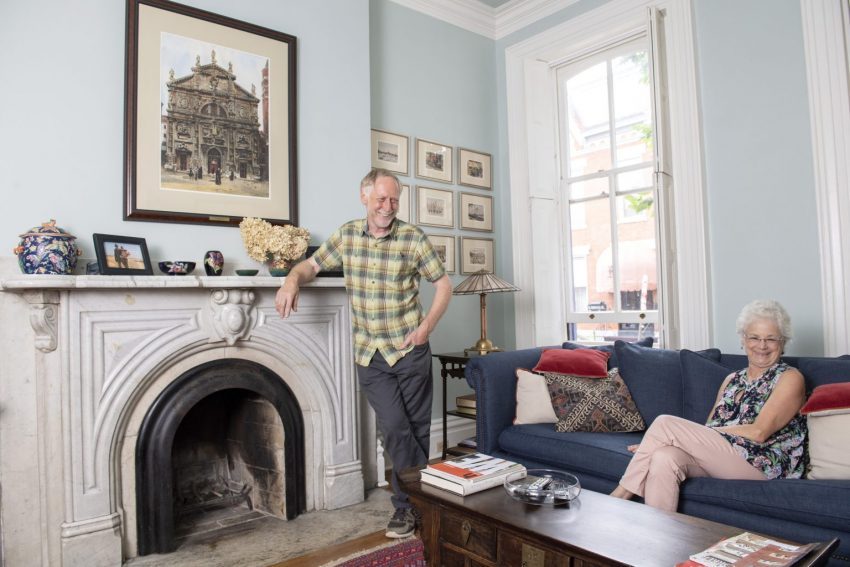
Clare and Duncan married in 1973 and moved to Pittsburgh, where Clare finished her Doctor of Philosophy degree in history.
When a row house around the corner at 609 Taylor Avenue became available—part of four row houses that PHLF had purchased, cleaned the surface, and protected windows with plywood— Duncan set up a meeting with Arthur Ziegler, president of PHLF, to negotiate a price for the house.
The Horners secured a mortgage and Neighborhood Housing Services provided a loan to help with improvements on the house, which had a roof that had fallen-in on the back end of the house.
While Duncan worked on the house, Clare completed her Ph.D. from the University of Pittsburgh, and went on to law school. Along the way, they had two daughters.
By this time the house had gone from two-and-a-half stories (the top was an attic) to four stories, including a finished basement and a widened dormer on the attic to accommodate a deck, larger windows, and a door leading out to the deck.
The summer of 1988 was an unusually hot one, with temperatures climbing to 100 degrees on several days. They started looking for a summer place which had a stream or a public pool nearby where the girls could swim and play and they could escape the heat.
They found it in Greene County. Clare spotted a small for sale sign on some land off of the main road. There was a stream, a small bridge which had been built by the Works Progress Administration during WWII, and a state park with a swimming pool that bordered on the property.
The Horners signed a land sale contract (common in rural areas), which allowed them to pay a small monthly payment for three years, after which they had to pay the balance of the sale price. The property – homesteaded in 1834 and owned by a prominent local family, the Chesses – had a house, a milk shed, two barns (grain and dairy), a chicken coup, root cellar, outhouse and a smoke house. Clare and Duncan removed several of the outbuildings and made one building into a playhouse for their girls.
Since the Chess family had owned the property for 100 years, Helen Chess Levander, the last of the Chesses to own the property, received a Pennsylvania century form, a certificate issued by the Commonwealth of Pennsylvania. The Chess family gave 30 acres to the state park in 1960, but their family cemetery is still on the park land. One of Helen’s nephews still lives across the road from Clare and Duncan.
In 2004, the Horners attended a special presentation at the Heinz Architectural Center, where Jack Miller, then director of gift planning at PHLF, spoke about saving historic farms through creative planned gift strategies.

Duncan Horner seen here at their 1800s-era farmhouse located on 70-acres of land protected through a preservation easement donated to PHLF.
As a result, in 2006, the Horners sold PHLF a preservation easement on their mid-19th-century, 70-acre farm and then re-financed the property to make a tax-deductible gift to PHLF to endow the easement.
An easement is a voluntary legal agreement that is recorded in the local recorder of deeds office and, once established, binds both the current owners and all future owners.
PHLF inspects its preservation easements on at least an annual basis and has a responsibility to defend and enforce the preservation easement as may be necessary.
Over the years, the couple bought five other homes in the Mexican War Streets Historic District, four of which they rented out. They received awards from the City of Pittsburgh for two of their restorations.
When asked if they have any advice for people buying historic properties, Duncan says; “Try to do as much of the renovation as you can. Be willing to take risks, be a little impulsive, and have faith in the future.”
They have since sold all but one house in the Mexican War Streets; that house is owned by one of their daughters.
Both the Horners’ daughters are interested in historic preservation. “The preservation tradition goes on,” said Clare.
-
20th-Anniversary Landmarks Scholarship Celebration on June 19
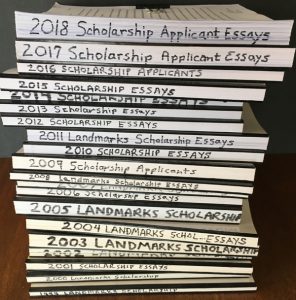 A record number of students––89 high-school seniors from 43 different schools in Allegheny County––applied to PHLF’s Landmarks Scholarship Program this April. During a private reception on Tuesday, June 19, from 5:30 to 7:00 p.m., the scholarship recipients and their parents will meet former recipients, Landmarks Scholarship Committee members, and PHLF trustees and staff. For further details, please contact Louise Sturgess, PHLF’s executive director.
A record number of students––89 high-school seniors from 43 different schools in Allegheny County––applied to PHLF’s Landmarks Scholarship Program this April. During a private reception on Tuesday, June 19, from 5:30 to 7:00 p.m., the scholarship recipients and their parents will meet former recipients, Landmarks Scholarship Committee members, and PHLF trustees and staff. For further details, please contact Louise Sturgess, PHLF’s executive director.Since 1999, PHLF has awarded scholarships to 72 high-school seniors from schools within Allegheny County. The $6,000 scholarship is for book and tuition expenses and is payable directly to the recipient’s college or university. In addition, 14 Honorable Mention awards (a one-time gift of $250) have been awarded since 2016. The essays that the students have written, describing places in Allegheny County that are especially important to them, are archived at PHLF and are well worth reading.
PHLF’s Scholarship Program is funded by the Brashear Family Named Fund, the McSwigan Family Foundation, and the Landmarks Scholarship Fund, including donations to the 2008 and 2014 Scholarship Celebrations.
“We welcome contributions from members and friends in this, our 20th anniversary year, to support our very successful program that has a profound and lasting impact on the students it has served and on PHLF,” said Committee Chair David Brashear. Please click here to contribute and direct your gift to “Scholarship Programs.” Thank you!
“We look forward to meeting our four new scholarship winners and six new honorable mention recipients on June 19,” said David. “After carefully evaluating all 89 applications, our Scholarship Committee selected the following people for awards”:
2018 Scholarship Recipients (a $6,000 award, payable over four years, for book and tuition expenses)
- William Johnson, from Pittsburgh Allderdice, who will be attending La Roche College (International Business);
- Katherine McRury, from Mt. Lebanon High School, who will be attending Penn State University (Architecture);
- Chandler Searcy, from Pittsburgh Obama, who will be attending Robert Morris University (Marketing); and
- Daniel Speer, from Upper St. Clair High School, who will be attending William & Mary College (History/Political Science).
2018 Honorable Mention Recipients (a one-time award of $250 for book and tuition expenses)
- Daniel Bigley, from Bishop Canevin High School, who will be attending the University of Pittsburgh (Chemistry & Spanish);
- Jennifer Jaffe, from Shady Side Academy, who will be attending the University of Pennsylvania (Philosophy, Politics & Economics);
- Franziska Nace, from Quaker Valley High School, who will be attending Columbia University (English);
- Zachary Trusky, from Bishop Canevin High School, who will be attending Grove City College (Electrical Engineering);
- Giovanna Varlotta, from Pittsburgh CAPA, who will be attending either the University of Pennsylvania or Brown University (Environmental Studies); and
- Zoe Vongtau, from Baldwin High School, who will be attending New York University (Global Liberal Studies).
Congratulations to all!
-
Building Pride in the Kids––That’s What It’s All About!
PHLF member Russ Coe (1916 – 2017), who generously donated to PHLF’s educational and neighborhood revitalization programs, always reminded Executive Director Louise Sturgess that our main goal in education was to “build pride in the kids!” PHLF does just that, through field trips for many school groups and other creative programs year-round, serving more than 5,000 young people.
Between May 1 and June 8, PHLF led 21 walking tours for school students, 9 full-day bus tours, 2 mural-making activities, and 1 full-day trolley tour (including an oral-history program with SLB Radio). In addition, PHLF published Neighborhood Stories, Including Mine, by fourth-grade students from Pittsburgh Colfax; made its Portable Pittsburgh kit available to two schools; welcomed four new summer volunteer interns; and selected ten college-bound students for scholarship or honorable mention awards!
After participating in a full-day field trip with PHLF, a teacher from Pittsburgh Colfax wrote: “This was the first (and maybe only time) that most of our third-grade students had visited the places we toured today. They all felt proud of where they live and were treated as people who are respected and expected to do great things.”
A teacher from Pittsburgh Greenfield added: “Thank you donors! What a gift of knowledge to the students. And the fact that this opportunity comes at no cost to our city school is a gift to the teachers and parents.”
We thank the McSwigan Family Foundation and corporate donors for generously contributing to our educational programs so they are affordable––or provided at no cost, thanks to the state’s Educational Improvement Tax Credit Program.
-
Thank You, Interns
Catelyn Cocuzzi and Lydia Strickling, both from Duquesne University, and Lauren Henry from Point Park University, completed volunteer internships with PHLF, from January to mid-April 2018. “We are always grateful to have the help of young people who are interested in history and knowledgeable about Pittsburgh,” said Executive Director Louise Sturgess. All three interns helped with various educational programs. In addition, Catelyn and Lydia inventoried hundreds of color slides taken by William Rydberg of buildings designed by Henry Hornbostel, and Lauren completed a tour script for our Firstside Area Walking Tour in October.
The interns summed up their experiences with PHLF as follows:
“In the time that I spent working with PHLF, I was reintroduced to the beautiful city of Pittsburgh. As a native of this city, I have taken its beauty and history for granted, but this organization and its mission has opened my eyes to all that it has to offer, both historically and culturally. I am beyond grateful for PHLF’s preservation efforts and the opportunities that it has provided me with.” ––Catelyn Cocuzzi (Masters in Public History, Duquesne University)
“One of the most valuable things I gathered from my time with PHLF is how important it is to pass down and share historical information with younger generations. There is so much to learn when looking at Pittsburgh history and it was amazing to be able to share some of that with elementary school students. They were always engaged and excited to learn about the past, which was so great to see. Learning history can be both fun and interactive.” ––Lauren Henry (History, Point Park University)
“My internship at PHLF was a very valuable experience. Not only did I get to see another side of the field of public history, but I also learned a ton about my hometown. Thank you to everyone at PHLF for this great opportunity!” ––Lydia Strickling (History, Duquesne University)
-
Students Present Models Showing New Uses for a Historic Building
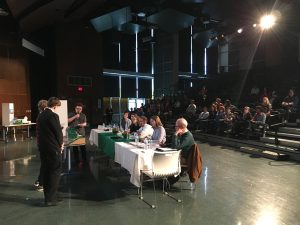 We have gone the whole nine yards. We built a model that we messed up on countless times. It took hard work, patience, high order thinking, and drive to complete this model. We have put much effort into the project, trying to find the final result that would make us content. We have gone through many steps to complete the process. ––The Nerds
We have gone the whole nine yards. We built a model that we messed up on countless times. It took hard work, patience, high order thinking, and drive to complete this model. We have put much effort into the project, trying to find the final result that would make us content. We have gone through many steps to complete the process. ––The NerdsEight teams of sixth-grade students from Eden Hall Upper Elementary School participated in PHLF’s third annual Architectural Design Challenge for the Pine Richland School District on April 24. Their challenge was to transform the Morledge House Garage on Chatham University’s Eden Hall campus into a place where people from the community could come to learn about the Eden Hall campus and interact with each other.
Each team developed a sustainable and meaningful program and spoke convincingly about their ideas to create:
- a black-box theater and museum highlighting Chatham’s history;
- a technologically advanced museum about Chatham and sustainability;
- a laser tag arena (by expanding the building underground). Players would win by answering questions about Chatham and sustainability.
- an activity center for sustainability, where everyone would make model cars using reusable materials that they would bring from home;
- an escape room where participants would find their way out of the woods, and a learning center with information about native plants and aquaponics;
- an escape room where people would use sustainable practices to solve missions to save the world;
- an art studio, with photographs, exhibits, and paintings highlighting Chatham’s history; and
- a woodworking workshop (recalling the original use of the building) and lounge.
The award recipients on April 24 were:
- First Place: The Lasarchitects
- Second Place and Student Award: Axolotl Army
- Third Place: Raspberry Architects
- Honorable Mention: Crafty Crusaders
- Penguin Award (most important lesson learned from taking a risk): RB2 Architects
We thank the following architects and educators for volunteering their time to comment on and judge the student projects: Cat Adams, architect; Kelley Folts (Canon Design); Roger Hartung (IKM); Nicole Kubas, urban designer; Paul Tellers, architect; and Samantha Weaver (CMU School of Architecture). PHLF is able to host this Architectural Design Challenge, and many other place-based educational programs, thanks to generous funding support from the McSwigan Family Foundation.
-
Building Pride/Building Character Programs Peak in May
Please keep these programs alive! Students really respond to the activities and remember them for years to come. They help them learn about the history of their special city! ––Pittsburgh Public School Teacher
In mid-May, PHLF will publish Neighborhood Stories, Including Mine, by a group of fourth-grade students from Pittsburgh Colfax. Inspired by a walking tour of the Squirrel Hill business district in October 2017, the book features student essays and artwork in Chapters 1 and 2. Chapter 3 provides space for any interested child to add his/her story to the book, and Chapter 4 includes tips and worksheets for exploring any neighborhood. “Erin Dulak, the fourth-grade ELA Teacher at Pittsburgh Colfax, collaborated with us on this project,” said Louise Sturgess, executive director of PHLF. “We are hoping that a second edition of the book can be distributed to Carnegie branch libraries for use during special programs with families and to all fourth-grade students in the Pittsburgh Public Schools. The book is a gem.”
Between April 25 and June 4, nine Pittsburgh Public Schools will participate in PHLF’s full-day bus tour to five historic places that help third-grade students understand the story of Pittsburgh. They associate “character-building words” with the City-County Building, Allegheny County Courthouse, Fort Pitt Museum, Fort Pitt Block House, and Duquesne Incline and try to become like those landmarks: “responsible, tolerant, respectful, and proud,” etc. The students enjoy the experience because they are with their friends and teachers, exploring the places they have learned about in Social Studies and meeting their Council representative, members of the Mayor’s staff, and experts at the Museum, Block House, and incline.
Third-grade students from three schools will also participate in PHLF’s Strip District Stroll after reading a book that is set in the neighborhood in the 1930s.
PHLF’s “Building Pride/Building Character” program is primarily funded through the state’s Educational Improvement Tax Credit program. Many thanks to our corporate donors.
-
Sacred Heart Church Special Program
PHLF members and friends are invited to attend a free program and tour on Sunday, May 20, from 1:00 to 3:00 p.m. at Sacred Heart Church, 310 Shady Avenue, Pittsburgh, PA 15206.
John Kelly of Kelly Art Glass, Al Tannler of PHLF, and docents from Sacred Heart Church will present: “George Sotter: Glassman, Painter, Storyteller––The Spectacular American Gothic Stained-Glass Windows of Sacred Heart Church.” The afternoon will include several brief presentations in the auditorium about the window restoration, stained glass designers, and architect. Participants will then be invited to walk around the church and talk with Sacred Heart docents, who will be stationed at significant locations.
In Pittsburgh Architecture in the Twentieth Century, Al Tannler writes: “The groundbreaking for Sacred Heart Roman Catholic Church (1926-54) was March 7, 1924; the choir and sanctuary were dedicated in 1929, and the façade window was dedicated in 1931, the year [architect Carlton] Strong died. His successor firm, Kaiser, Neal & Reid, completed the church.”
Participants will be able to admire the impressive stone carvings, woodcarvings, and murals, as well as the stained-glass windows, designed by George and Alice Sotter and made in Pittsburgh at Hunt Stained Glass Studios. To establish the design parameters of the 1,200-square-foot façade window alone took eight years of study to develop the content and four extended trips to Europe to refine the artistic ethic. Those 54 panels illustrate the History of the Catholic Church in America. We’ll examine this masterpiece as well as the 108 storyboards in the aisle windows. Then we’ll review the additional 4,000 square feet of stained glass in the main church, Blessed Sacrament Chapel, and Lady Chapel, which was completed by George Sotter’s wife and partner, Alice, after his death in 1953.
Program details:
- This program is free to the public. Donations are welcome and will be used to help fund the restoration of the Lady Chapel.
- Reservations are appreciated. Please call Sacred Heart: 412-661-0187.



